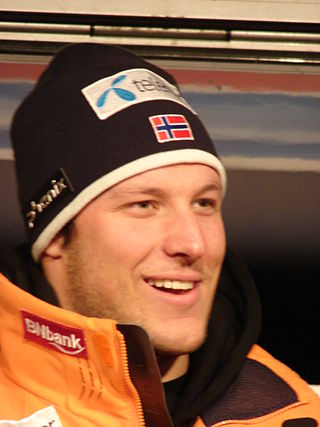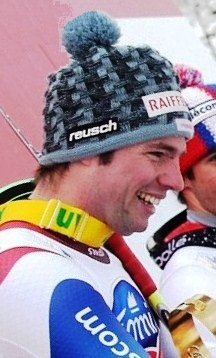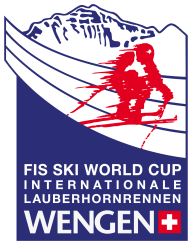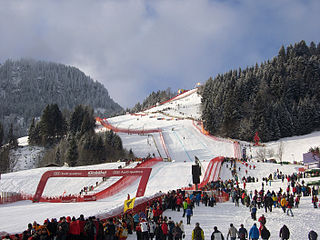
The Hahnenkamm is a mountain in Europe, directly southwest of Kitzbühel in the Kitzbühel Alps of Austria. The elevation of its summit is 1,712 metres (5,617 ft) above sea level.
Hartmann "Harti" Weirather is a former World Cup alpine ski racer from Austria. Born in Reutte, Tyrol, he specialized in the downhill event.

Aksel Lund Svindal is a Norwegian former World Cup alpine ski racer.

Roland Collombin is a former World Cup alpine ski racer from Switzerland, a two-time World Cup downhill champion and Olympic silver medalist.

Peter Fill is a former World Cup alpine ski racer from northern Italy. Born in Brixen, South Tyrol, he formerly competed in all disciplines, and later focused on the speed events of downhill, super-G, and combined. Fill won the World Cup season title in downhill in 2016 and in 2017, and the combined title in 2018.

The 43rd World Cup season began in late October 2008 in Sölden, Austria, and concluded in mid-March 2009, at the World Cup finals in Åre, Sweden.

Johan Clarey is a French World Cup alpine ski racer. He specializes in the speed events of downhill and super-G.

Georg Streitberger is a retired World Cup alpine ski racer from Austria. Born in Zell am See, Salzburg, he specialized in the speed events and won three World Cup races, two in super G and one in downhill.

Dominik Paris is an Italian alpine ski racer, who specializes in speed events of downhill and super-G. He was the world champion in super-G, as the gold medalist in 2019 at Åre, Sweden.

Beat Feuz is a Swiss former World Cup alpine ski racer, specializing in the speed events of downhill and super-G. He is 2017 World champion and 2022 Olympic champion in downhill. In 2021, he won consecutive downhills on the famed Streif at Kitzbühel.

Matthias Mayer is an Austrian retired World Cup alpine ski racer and Olympic champion.

The Lauberhorn ski races (Lauberhorn World Cup alpine ski races are among the highest-attended winter sports events in the world, attracting around 30,000 spectators each year. An established attraction is the airshow by the Patrouille Suisse, the aerobatic demonstration team of the Swiss Air Force. The 2016 races were held 15–17 January.

Streif is a World Cup downhill ski course in Austria, located on Hahnenkamm mountain in Kitzbühel, Tyrol, competing for the Hahnenkamm Races since 1937.

The International Ski Federation (FIS) Alpine Ski World Cup was the premier circuit for alpine skiing competition. The inaugural season launched in January 1967, and the 2017–18 season marked the 52nd consecutive year for the FIS World Cup.

The International Ski Federation (FIS) Alpine Ski World Cup was the premier circuit for alpine skiing competition. The inaugural season launched in January 1967, and the 2018–19 season marks the 53rd consecutive year for the FIS World Cup.

The International Ski Federation (FIS) Alpine Ski World Cup was the premier circuit for alpine skiing competition. The inaugural season launched in January 1967, and the 2020–21 season marked the 55th consecutive year for the FIS World Cup. As it had every year since 2006, the season began in Sölden, Austria in October, and it ended with the World Cup finals in March, which were held in Lenzerheide, Switzerland. However, the COVID-19 pandemic forced many changes to the original racing schedule. Among them were the following:

The men's downhill in the 2018 FIS Alpine Skiing World Cup involved nine events, including the season finale in Åre, Sweden. Swiss skier Beat Feuz ended the two-season reign of Italy's Peter Fill and won the season title in this discipline after a season-long battle with former discipline champion Aksel Lund Svindal of Norway.

The men's downhill in the 2017 FIS Alpine Skiing World Cup involved eight events, including the season finale in Aspen, Colorado (USA). Due to difficult weather conditions, only two downhills were held during the first twenty events of the 2016-17 World Cup season, meaning that six were held during the final sixteen events. Defending discipline champion Peter Fill of Italy, who did not win a downhill all season, went into the finals trailing Norway's Kjetil Jansrud by 33 points, but he finished second in the finals while Jansrud finished 11th, thus permitting Fill to repeat as downhill season champion by 23 points despite not recording a win.

The men's overall competition in the 2016 FIS Alpine Skiing World Cup involved 44 events in 5 disciplines: downhill (DH), Super-G (SG), giant slalom (GS), slalom (SL), and Alpine combined (AC). The newly introduced Parallel giant slalom event at Alta Badia, Italy—which was included in the giant slalom season standings—was a relatively short Giant slalom course that pitted the men against one another in a modified bracket-reduction format from a field of thirty-two qualifying skiers, eventually whittled down to just four final-round racers in a "large final" and a "small final".

The men's super-G competition in the 2016 FIS Alpine Skiing World Cup involved eight events, including the finals in St. Moritz, Switzerland.

















